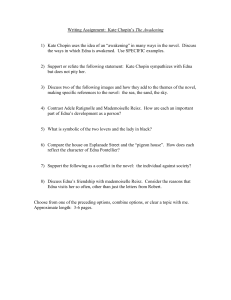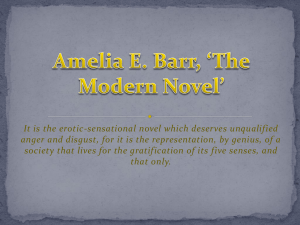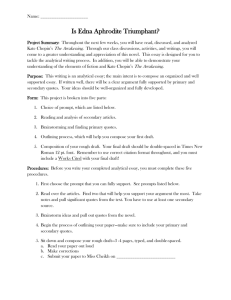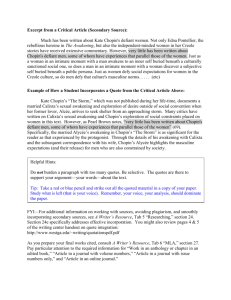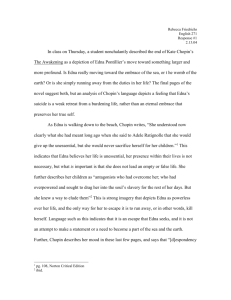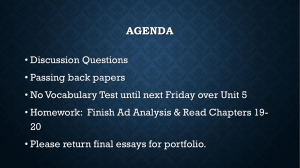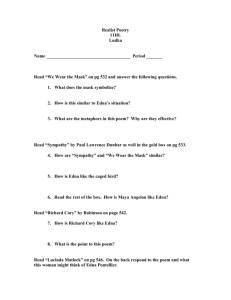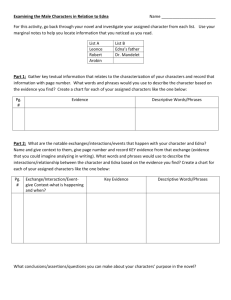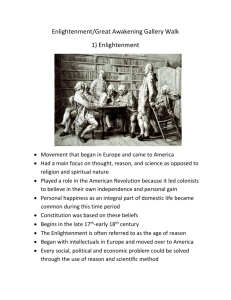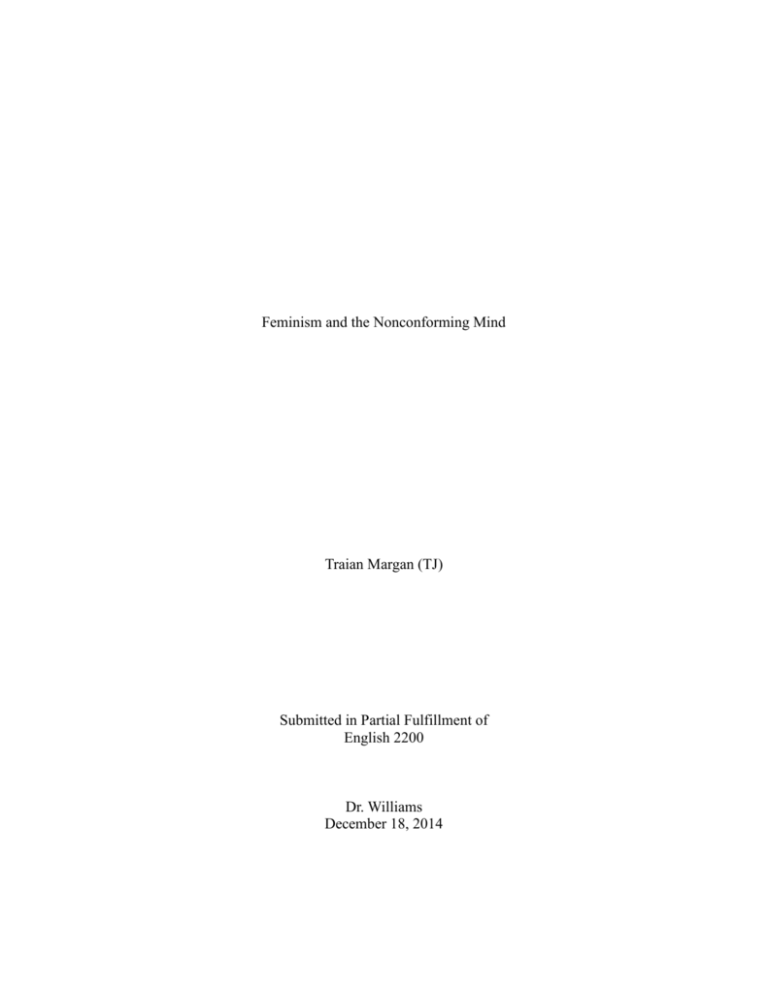
Feminism and the Nonconforming Mind
Traian Margan (TJ)
Submitted in Partial Fulfillment of
English 2200
Dr. Williams
December 18, 2014
Abstract
My paper will mainly focus on Edna’s awakening and what feminism was originally intended to
be. I will examine why exactly Edna had to die and how she found herself, along with how feminism
started and what feminism entailed for women of that time period. I will show the importance of
independence for women. It is important for women to be their own person and not have to be married
or live life under a man’s rule in order to survive. I will also incorporate Chesnutt’s ‘The House Behind
the Cedars’ because it too shows the awakening a main female character has and what she must do in
order to feel normal. I will compare Rena and Edna in a way that will show how two very different
women come to almost the same realization, which they are not who they want to be. They want to
break society’s hold on them. I will also explore how both Chestnutt’s ‘The House Behind the Cedars’
and Chopin’s ‘Awakening” destroyed the writers’ careers.
Women were always told how to live. From birth told how to be by their parents up until their
wedding day, after that her husbands rules apply and she is still told how live and what her
responsibilities are to be. A woman's job was to be a house wife, she was to serve her husband and tend
to the kids. The husbands would provide for the family but they would also go out and about after work
where the women were made to stay home and would not be able to get paying jobs or go out with out
their husbands with them. This made woman want change and brought up the feminist movement and
the sexual revolution. A book showing just this is Kate Chopin's The Awakening where Edna Pontellier
struggles with being a mother and wife but find herself doubting where she was and having a need to
break free and leave her family to be herself. I would also like to explore Charles Waddell Chesnutt's
The House Behind The Cedars and Rena's struggle with breaking free from who she is and trying to be
who she wants to be. Both women in these books come to a realization and break conformity to be able
to express themselves no matter the faced consequences by either of them. These Books compare so
much to the ideas of Ralph Waldo Emerson who wrote the essay “Self-Reliance” who writes about not
conforming and being who you are and not who you are told to be.
Emerson's essay starts off with a quote from Epilogue to Beaumont and Fletcher's Honest
Man's Fortune “Man is his own star; and the soul that can render an honest and a perfect man,
commands all light, all influence, all fate; nothing for him falls too early or too late. Our acts our angels
are, or good or ill, our fatal shadows that walk by us still.” I like this quote because for me it translates
that we control who we are and that we must live for ourselves mainly. We are constantly told by which
standards to live by and who to listen to. Emerson explains to us that who cares what others think about
you. You are living your life they are not living it for you, in the 7th paragraph of his essay he says
“What have I to do with the sacredness of traditions, if I live wholly from within? My friend suggested,
- “But these impulses may be from below, not from above.” I replied, “They do not seem to me to be
such; but if I am the Devil's child, I will live then from the Devil.”” What he is trying to say by this is
that he knows who he is and does not need any kind of tradition to guide him, and that he lives from
within himself for himself not for anyone or anything including God or the Devil and however he is
seen by others is their opinion. In the 9th paragraph he states just this “What I must do is all that
concerns me, not what the people think.” this essentially brings me to the stories of Edna from “The
Awakening” and Rena from “The house Behind the Cedars”. They both have feelings of a need for
change in their lives and at some point just stop caring what others think because they cant handle
where they are anymore.
Edna is seen crying in chapter four for no real reason. She cries while her husband sleeps and
has no reason for her crying. Her husband gives her everything and loves her but she still feels
unhappy. Rebecca from slander.com wrote about some quotes from “The Awakening” and her
explanations to them, she finds the passage from chapter six “In short, Mrs. Pontellier was beginning to
realize her position in the universe as a human being, and to recognize her relations as an individual to
the world within and about her.” Rebecca sees this as her first awakening stating “Chapter VI could be
called Edna's first awakening, wherein the idea that she isn't just a wife or a mother or even a daughter
dawns inside her. The idea that she has likes and dislikes that are her own, when she has been raised
and cultivated to put her own feelings aside for the sake of conforming to social customs, is shocking
and hard to understand. Throughout the rest of her vacation, she tries to figure out who she is outside of
who other people think she is.” While I agree to this I feel her first sense of her awakening and
breaking conformity was when she found herself crying for no reason. I think deep down she knew
why she was unhappy and that was because of how her life was thus-far regardless of the love her
husband gave her. Edna eventually reveals that while she loves her kids she does not like them, and I
think this is because she was not truly ready to be a mother and wanted to do her own thing and not be
tied down by her husband and kids, as we know she only got married to her husband to get back at her
father and sister. She wanted new experiences and wanted to explore something outside of her comfort
zone.
Rena from “The House Behind the Cedars” has an awakening as well different to that of Edna's
but similar in the sense that both felt almost trapped but they life they were currently living. Rena and
her Brother John were both black in a white world however John was able to leave his hometown and
make a name for himself because he was light skinned and passed as white. Rena was not so lucky and
could not pass in her town however John comes back to “save” her. He brings her to where he no
resides and makes her go to school to learn to be lady like and talk like white people do. She wants
nothing more than to pass. With the help of her brother she eventually does pass and is set to married a
white man. Rena eventually comes to realize that eventually the secret of who she is and that she is not
actually white. She begins to realize that no matter how hard she tries to play the part eventually she
would be found out especially is she is to give birth to a child and that child does not turn out to be
white? What would happen to her then? It would become too much for her to handle. She was to die or
to live a lie she could not possibly live without the truth being revealed. Rena makes her way up just to
end up back at the bottom, back home with her mother as a black girl instead of white. When this
happens I believe this to have been her “awakening” and when she realized she could not do this again
and it was over and after regressing back home her brother gives her a second chance to move away
with him and she decides not to go because at this point she could not live through all that again. She
was not willing to try and convince people for a second time she is white. She just wanted to live out
the rest of her days as she is. She eventually dies after being chased by two men.
Woman were set up to be what they were told and did not have much say in this. This
eventually sparked an uprising and the start of feminism and the sexual revolution. The husbands made
the money and the wives only got what the husbands gave them. In the 1960's and 70's the feminist
movement was sparked and rights were trying to be given to women to get equal paying jobs and for
them to be able to have equal rights in the workplace promotion and condition wise. The feminist
movement was made so that future generations would not be oppressed as their mothers, grandmothers
and so on had been. They were made to live by the Napoleonic code which was against woman's rights.
It states that woman were essentially slaves and could not make choices without their husband or father
present to make the choice for them. This code also stated that if the wife died the husband would gain
custody of the children and he must wait ten months before he is able to get married again. They were
defined by man, given by their father and taken by another man to be their husband. The woman
wanted to have political, social and economic equality with men. In Independence from the Sexual
Revolution Author Diane Densmore quotes "You should be intimidated by being put down by
men." "Leave your family if it’s so oppressive." "If you don’t like the way your lover treats you,
you can get out of bed." "It’s your own fault if you don’t get good jobs—you let yourself be
discouraged, you took the unchallenging, ‘feminine’ courses of study in school." this quote
sums up how women are made to be insecure and seem weak. Slowly women all over were
realizing that this is not how it should be and they fought to be equals in all ways to be able to go out
when they wanted to not just by permission of a man. Because of Chopin's “The Awakening” she was
thought to be a feminist when in reality she was not, her book however was a big part in the feminist
movement in showing how women need to be free and not suppressed by men. As stated in class
women instinctively envy the maleness of man and reject their own sex. They did not envy in the sense
that they wanted to be man but the fact that men can be sexual and assertive and to envy the dominance
men had in society and the man being immune to dilemmas. Densmore writes “Let me say something
about the objective conditions of the present. We are crippled people living in an evil and
destructive world. We have a great deal to do beyond the mere business of living. There is
much work that needs to be done, and not, by any means, just the work of liberating people
and making a revolution. There is the work of rebuilding ourselves, learning to know
ourselves and our potentials, learning to respect ourselves, learning to respect and work with
other women. We must overcome all the self-destructive patterns we have been taught in a
lifetime of being female.” (Densmore, para 24) which I think is a beautiful passage, it shows
that we need to stop making standards and stop sending people on a destructive path that
forces them to conform to societies view of how to live that we in fact need to work more on
who we are as a person then as to who we are as a whole. Another passage from Densmore
that I found fit perfectly with the point of being told how to live, “Children who are told over
and over that they are liars or thieves become liars or thieves. People who are told over and
over that they are crazy become crazy. If you are told over and over that you are a being who
has profound sexual needs the odds are very good that you will discover that you do.
Particularly when other outlets are forbidden or discouraged. Particularly when it is
emphasized that those who do not feel these needs are frigid, neurotic, sexually maladjusted
(which for a woman means essentially maladjusted), dried up, barren, to be pitied.”
(Densmore, para 22) sums this up perfectly, women were told how to be so they started being this way
and in turned believed this was right. It was not until enough women started to wake up and realize this
was not right did they start to stand up, which brings me back to “The Awakewning”
Edna starts to realize the life she has is not the life she dreamed of living. She wanted to leave
her husband and kids but struggles because that was unheard of back then, for a mother to leave her
children. Women left husbands all the time but to leave your kids was some other level of sin. How can
a woman leave a life she had given birth to? She wants other men and she wants to be happy she wants
to explore other options in life (like learning how to swim) she was introduced to art by Mademoiselle
Reisz and Edna realizes she wants to do something artistic but Reisz warns her “the artist must possess
the courageous soul.......courageous, ma foi! The brave soul. The soul that dares and defies” (chopin,
64) this was a big part in her awakening because she started experiencing new ideas. Edna begins to
realize when your genious calls you and people say no you have to shun them as described in Emersons
Self-Reliance. Another awakening moment is that she learns you have to find yourself through sex
Edna begins to think that not only does she not want a man she also did not need a man which back
then was absolutely unheard of. The fundamental dilemma for women; sexual fulfillment seems to
depend upon one set of psychological attitudes, submissiveness and passivity, while the fulfillment of
equality seems to depend upon the opposite set of psychological attitudes, competitiveness and self
assertion, and Edna was not happy living this way. Even though she had a husband she also had two
lovers and one of them she loved more than her husband and would have rather been married to him.
She now wants to be with a man on her terms and no one else's and refuses to ever again get married
again after leaving her husband. She grows from all this eventually leaves her family to live on her own
and do things her way. Edna also comes to realize that she cant live this way either and starts going
into the ocean. She did not want to go back to life as it was and the ocean which never ends seemed
like the right place for her so she started swimming and swimming until she could not anymore and
essentially drowns. This however symbolizes her freedom and her break out of the conformity society
had established for her. As she is going deeper and deeper into the ocean sh says “Good-by—Because I
love you” (Chopin, pg 117) she knows that she is leaving for good and is showing her love to her
family even though she will never see them again even if she did not die I believe she would have just
left and never went back to them which would have caused conflict within her considering she may
want to turn back for them (even though I feel she never would have) and she wanted to just leave and
be free which she felt she could not do if she kept on living and there was also a possibility that she
would have been killed anyway for her actions and leaving her family because lets face it what kind of
mother leaves her kids? Back then men had legs and women did not ion the sense that they had no
homely attachment they would and could leave when they wanted where as the women were held down
by their kids, they are stuck with the stigma that the mother is the one who should care for the children
and they are considered more horrible than a man is for doing the same thing a man would do.
“The awakening” and “The House Behind the Cedars” were both revolutionary books that
showed just how women were viewed and how they were trying to break this fixation that they are to
be one way and not any other way. The feminist movement allowed for women all over to be able to be
equal to their male counter parts. The barriers were slowly broken down and this enabled women to
have their own personalities and their own views and thoughts and friends and better jobs and political
standings. The awakening was even banned for years because of how Edna was in this book a woman
who left everything she was supposed to stay with in order to live for herself even though she had died
in the end. Like I had said because of this book Chopin was considered to be a feminist when she was
far from it, she was just an exceptional writer who was able to make a concept come to life through her
work that was not normal for the time the book was published. This excerpt from The 1960s-70s
American feminist movement: breaking down barriers for women, “The Feminist movement of the
1960s and '70s originally focused on dismantling workplace inequality, such as denial of access to
better jobs and salary inequity, via anti-discrimination laws. In 1964, representative Howard Smith of
Virginia proposed to add a prohibition on gender discrimination into the Civil Rights Act that was
under consideration. He was greeted by laughter from the other congressmen, but with leadership from
Representative Martha Griffiths of Michigan, the law passed with the amendment intact.” shows just
how much of a joke woman's rights were to some men. While other men were with the women and
trying to help them a majority of them worked against them. Women now a days are much more
fortunate because of this movement even though now a days women say they are feminist but abuse the
saying “i am a feminist” they do not see it anymore as liberation and as normal but use it to make them
seem more superior. The 1960s-70s American feminist movement: breaking down barriers for women
also states “The women's movement used different means to strive for equality: lobbying congress to
change laws; publicizing issues like rape and domestic violence through the media; and reaching out to
ordinary women to both expand the movement and raise their awareness of how feminism could help
them.” this was another great change because a lot of women were essentially getting raped by their
husbands (I know sounds wrong but it was happening) and they had no choice but to except it, they
were not taken seriously at all and it was not until the laws were changed and new laws were passed
that women could go up against men and get the justice that they longed for and deserved.
“The Awakening” was Chopin's greatest piece however it destroyed her carrier. There had been
many books before this that showed a woman leaving her husband for various reason. What made this
book different than the rest was the fact that Edna not only leaves her husband behind she leaves her
kids behind. This sent people in an outrage and they were not able to handle this concept. The book had
been banned until 1969 because of this. Chesnutt's “The House Behind the Cedars” was his Chesnutts
great demise. While a wonderful read people were not ready for it. To read of a black person passing as
white must have scared and shocked people. As discussed in class Chesnutt sought to bring attention to
racial divide in America and rectify it by providing a compelling vision for all whites to see; the
perception of black people as human beings with problems, passions, aspirations, love and desire, pain
and disappointment, emotion and logic. This was quite unheard of for the time period and brought up
major conflict especially because Chesnutt was a black man who looked white but no matter what he
did or how he presented himself he could never pass as white as John did and as Rena almost had in
“The House Behind the Cedars”. Whiteness was seen as freedom.
Both authors wrote what in my opinion are two great books that show how while difficult,
breaking the social norm is possible. Even though both protagonists in the books ended up dead by the
end of the stories the points were made. It was soon to be time for change and these books while maybe
not intended help in this change and a new society was formed where men and women (while I will be
honest not entirely) could be equals could have the same jobs, they have equal say in politics,
economics, and were making somewhat equal money and had equal opportunities to advance in the
work place and women were now no longer destined to be stuck home under the rule of their husbands
they could now live free and choose not to get married, not to have kids and could open their eyes to
the outside world and enjoy things they never imagined doing and not having to answer to anyone or
having to go where the husband allows like a dog on the leash.
Works Cited
"[443] The House Behind the Cedars - Charles W. Chesnutt." A Guys Moleskine Notebook. 17
Feb. 2012. Web. 5 Dec. 2014. <http://mattviews.wordpress.com/2012/02/17/443-the-house-behind-thecedars-charles-w-chesnutt/>.
Chesnutt, Charles W. The House Behind The Cedars. Digi-Media-Apps Ltd 2014.
Chopin, Kate. The Awakening. Charlottesville, VA; U of Virginia Library, 1997. Print.
"Independence from the Sexual Revolution." By Dana Densmore. Web. 5 Dec. 2014. .
PBS. PBS, n.d. Web. 5 Dec. 2014.
"Self-Reliance - Understanding the Essay." Self-Reliance - Understanding the Essay. N.p., n.d.
Web. 5 Dec. 2014.
Shmoop Editorial Team. "Edna Pontellier in The Awakening." Shmoop.com. Shmoop
University, Inc., 11 Nov. 2008. Web. 5 Dec. 2014. <http://www.shmoop.com/the-awakening/ednapontellier.html>.
"The 1960s-70s American Feminist Movement: Breaking Down Barriers for
Women." Tavaana. N.p., n.d. Web. 5 Dec. 2014.
"The Awakening, Kate Chopin, Characters, Setting, Questions."KateChopinorg. N.p., n.d. Web.
5 Dec. 2014.
"The Awakening • Significant Quotations." Significant Quotations: The Awakening by Kate
Chopin. N.p., n.d. Web. 5 Dec. 2014.

